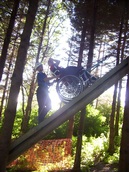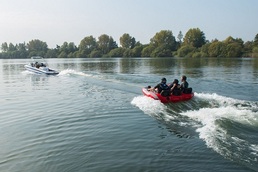Holidays for the disabled: uplifting options
There are estimated to be at least 11 million people in the UK who are registered as disabled and many more who are unregistered, yet all too few holiday opportunities for them. Tales of holiday disasters abound with inaccessibility to rooms and facilities being common complaints.
 The solution it seems is to use a specialist travel operator who understands what is needed – and most importantly to plan well ahead as the good facilities get booked up well ahead. It is also important to aim for a holiday that fits the needs of the disabled person as exactly as possible.
The solution it seems is to use a specialist travel operator who understands what is needed – and most importantly to plan well ahead as the good facilities get booked up well ahead. It is also important to aim for a holiday that fits the needs of the disabled person as exactly as possible.
Planning essential
Lisa Newton, founder of Can Do Holidays, a free advisory service dealing with holiday opportunities in England and Wales, says: “When thinking about a holiday, the most important thing is the planning. Make sure you list all the equipment and so on that is needed.”
People with all types of disability, even those whose disability is the frailty of old age, are welcome to make use of her service and she personally checks all the venues to make sure that everything is in place and so that she can advise clients accurately as to where to go. As well as good access, it’s often the little things that are important. She cites an example of doors that can be locked with a key at night – essential for some types of learning disability and for those living with dementia.

Ms Newton is proud of many of the holidays she has arranged often for people who have either not been able to travel much at all or have given up all hope of a holiday. Most recently, she arranged a break for one young family where the 35-year-old father had fast advancing multiple sclerosis and it was thought they would never go away again as his medical and physical needs were so complex.
She says: “It took four months of military-style planning as regards accessibility, community care, nursing, meal provision and so on but we managed to arrange a lovely week away in a luxurious log cabin in Lincolnshire where the wife was able to spend quality time with her husband and young children, time that would not have otherwise been possible.”
Her holidays arrange short or longer breaks in hotels, bed and breakfasts, cottages on one level, activity centres, caravans and most recently luxurious yurts for those who wish to try this fashionable way of camping. As Ms Newton says: “People want something that does not look like a nursing home and I try to provide it.”
Adventures abroad
Paul Fogarty, managing director of Holidays for the Disabled, who is himself severely disabled, understands perfectly the difficulty of finding a good holiday. “So much needs to be developed and properly advertised. Some hotels, for instance, do have rooms that have been specially adapted for disabled people but do not advertise them.”

His firm concentrates on holidays abroad mainly for people who are physically disabled ranging from apartments, hotels and villas in many of the sun spots of Europe to city breaks in New York and wheelchair accessible safaris in Africa. He like, Lisa Newton, is scrupulous when considering the pros and cons of various places. Some of the things that can be an issue for disabled people are probably not even considered by able-bodied travel operators.
Naming a couple of examples, Mr Fogarty says: “For instance, many of the streets in Malta are cobbled, which can be difficult for wheelchairs, and Egypt is not too good when it comes to finding vehicles that can carry wheelchairs.” But thorough research he believes can overcome the majority of problems, adding: “I personally don’t like to say that anywhere is inaccessible. With planning, thought and the right equipment, anywhere is accessible.”
“The nuts and bolts of a disabled holiday are the same as for an able-bodied holiday. The extras such as assisted transfers do cost a bit extra but not too much more.”
Respite care
For those who are housebound for much of the time with family or a care worker, a respite break for a week or two may be the answer for both parties including as it does plenty of activities and the chance to socialise. The charity Revitalise is the largest provider of such holidays in the UK with 24-hour on-call nursing care for adults with physical disabilities, as well as now offering dedicated breaks for people with Alzheimer’s and dementia and their partners or care workers. Usefully, the charity can also give advice on obtaining funding to help cover the cost of the holidays.
With more than 50 years of experience catering for people with over 150 different disabilities, Revitalise currently has three centres in Essex, Southampton and Southport and at the moment provides around 5,000 weeks of breaks a year. Each centre provides an exciting range of themed weeks, which include a host of excursions, in-house activities and evening entertainment, ensuring that every guest has the break they need. Music, youth and ‘young at heart’ weeks are currently the most popular holidays and demand continues to grow. Colin Brook, communications officer for Revitalise says: “The demand for our holidays suggests that there currently isn’t enough high quality holiday provision for disabled people in the UK and this demand will only increase.
"In many cases respite care amounts to little more than warehousing for disabled people - this needs to change. We’ve always believed that access to regular, good quality respite breaks for disabled people and those who care for them should not be considered a luxury but an absolute essential in enabling families to carry on coping.”
Holiday experience: “I felt like I wasn’t disabled”
June Burden, of Erith, Kent, cares for her 25-year-old daughter Sally-Ann Burden, who has cerebral palsy. She says: “I had never spent a single night away from Sally-Ann before her break with Revitalise. As a carer you’re not used to your children being away and you can’t help but worry and miss them; this was the first time I felt that I really needed to take a break and so did Sally-Ann. 
“She was so excited about her break -- as a bit of a daredevil she was really looking forward to trying out water-skiing -- and her excitement meant that I felt like everything was going to be ok. It was so important for us to have the respite and it was a really good rest for the both of us. I could let my hair down and for once in a blue moon I didn’t have to worry about the responsibilities of home.
“Without outside funding we would never be able to have a break. Often the person you care for relies so much on you, needing 24-hour care, you have no time for a full time job. I did go to work part time but had to give it up because Sally-Ann’s care needs were so high. Often the additional costs that you don’t consider can add up; we need a really big vehicle for wheelchair access, an electric bed, electric lift, electric wheelchair, it does all eat quite heavily on the budget.
“As Sally-Ann has said to me so many times ‘Mum, you’re my district nurse, my physio, my carer, you do so many jobs, if I can go somewhere where I’m looked after then you can just be my Mum’ and that really touched me. Being Sally-Ann’s Mum and carer has taught me so much about tolerance, patience and empathy.
“So many people would view Revitalise as just going on a break but it’s so much more than that. There are holiday breaks for people with disabilities but those holiday breaks finish when they turn 16. There are breaks for older people and breaks for young people but there’s nothing for people in the middle. The thing is when they’re children, they’re light and easier to carry, but when they get to adult stage it can get much more difficult.”
 Sally-Ann adds: “When I was water-skiing, I felt like I wasn’t disabled. I love to do things that test me and make me feel I can do anything I set my mind to.”
Sally-Ann adds: “When I was water-skiing, I felt like I wasn’t disabled. I love to do things that test me and make me feel I can do anything I set my mind to.”
More information
For Can Do Holidays visit http://www.candoholidays.com/index.php/about-can-do or call 0800 2983052
For HolidaysfortheDisabled.com visit http://www.holidaysforthedisabled.com/ or call 0800 6226772
For Revitalise holidays visit http://revitalise.org.uk or call 0303 303 0145
Latest Features News
 28-Nov-19
2019 Election: Labour pledges £10.8 bn for free personal care while Boris Johnson sidelines social care
28-Nov-19
2019 Election: Labour pledges £10.8 bn for free personal care while Boris Johnson sidelines social care
 18-Oct-19
Podcast: Wendy Mitchell and dementia: 'My biggest fear is not knowing who my daughters are'
18-Oct-19
Podcast: Wendy Mitchell and dementia: 'My biggest fear is not knowing who my daughters are'
 30-Sep-19
World's oldest diver aged 96 says 'never accept the fact you are getting old'
30-Sep-19
World's oldest diver aged 96 says 'never accept the fact you are getting old'
 27-Sep-19
Exclusive: Care minister backs care workers' call for time off to grieve and attend funerals
27-Sep-19
Exclusive: Care minister backs care workers' call for time off to grieve and attend funerals
 20-Sep-19
Podcast: Gyles Brandreth urges care workers to learn poetry with elderly
20-Sep-19
Podcast: Gyles Brandreth urges care workers to learn poetry with elderly